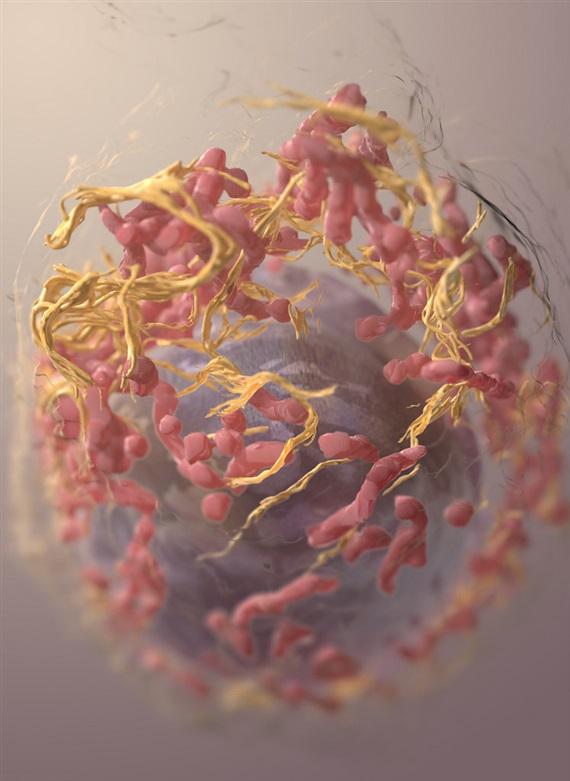Combination immunotherapy yields high survival rate in advanced melanoma
BOSTON – More than half of patients with advanced melanoma who received a two-drug immunotherapy combination in a clinical trial have survived at least four years – including some patients who went off the drugs prematurely because of adverse effects.
The four-year survival rate of 53 percent in patients treated with two checkpoint inhibitor agents is an unprecedented long-term outcome in metastatic melanoma, researchers say.
“To the best of our knowledge, we have not seen a 53 percent overall survival rate with any available treatment at four years of follow-up in a randomized setting,” said F. Stephen Hodi, MD, director of the Melanoma Center at Dana-Farber Cancer Institute. He presented the findings from the CheckMate 067 trial at the European Society for Medical Oncology (ESMO) in Munich and is first author of a simultaneous publication in The Lancet Oncology.
The combination of two drugs, ipilimumab (Yervoy) and nivolumab (Opdivo), proved significantly more effective on several measures at controlling the aggressive cancer than did ipilimumab given as a single agent. The four-year results represent the longest follow-up to date of patients receiving ipilimumab plus nivolumab, Hodi said.
“Our results demonstrate that long-term survival outcomes can be achieved with the combination of nivolumab and ipilimumab in patients with treatment-naïve advanced melanoma, including patients who discontinued treatment early due to adverse events,” said the report in The Lancet Oncology. Senior authors are James Larkin, FRCP, of the Royal Marsden NHS Foundation Trust, in London, and Jedd D. Wolchok, MD of Memorial Sloan Kettering Cancer Center and Weill Cornell Medical College.
The historically low survival rates of patients with advanced melanoma began to improve in 2011, when the checkpoint inhibitor ipilimumab was approved. Ipilimumab targets the CTLA-4 checkpoint, which acts as a brake on the immune response against cancer cells. Nivolumab blocks the PD-1checkpoint, a different brake mechanism on the immune response.
The CheckMate 067 study has followed 945 patients with previously untreated, inoperable stage III or stage IV melanoma who were randomized to receive nivolumab plus ipilimumab; nivolumab plus placebo, or ipilimumab plus placebo.
According to the new report, 58 percent of patients treated with the two-drug combination had a response – shrinkage of their cancer -- compared with 45 percent who received nivolumab alone and 19 percent in the ipilimumab group. The researchers noted that these response rates have remained stable over time, the rate of complete responses – in which tumors disappeared – has continued to increase. This suggests, they said, “that best overall responses can improve over time with immune checkpoint inhibitors, even without further treatment.
The median length of survival for patients receiving the combination has not been reached; it is 36.9 months in the nivolumab group and 19.9 months in the ipilimumab group.
Another clinical end-point, progression-free survival, also favored the combination. In patients treated with nivolumab and ipilimumab, a median of 11.5 months elapsed before the disease progressed – such as a new lesion appearing – compared with 6.9 months for nivolumab and 2.9 months for ipilimumab. “Progression-free survival means something has changed, but it hasn’t led to the patient’s demise,” explained Hodi.
In this study, patients underwent treatment until they had received the maximum clinical benefit (as defined by the investigator); unacceptable side effects occurred, or the patient asked to stop treatment. Among patients who had survived for four years, 71 percent who received the combination were off treatment; 50 percent who got nivolumab were off treatment, as were 39 percent who received ipilimumab.
As was reported earlier in the CheckMate 067 trial, a higher rate of adverse side effects was reported in patients who received the immunotherapy combination – 59 percent, compared with 22 percent of nivolumab patients and 28 percent who received ipilimumab alone. Serious adverse events were not analyzed for this four-year follow-up.
The study was funded by Bristol-Myers Squibb.
Hodi declared that he has received research grant support from and has had a paid consulting or advisory role with Bristol-Myers Squibb; has had a paid consulting or advisory role with Merck, EMD Serono, Novartis, Celldex, Genentech, Incyte, Apricity, Bayer, and Amgen; is a co-investigator on an issued patent on the use of tumor antigens; has four pending patents and one issued patent on therapeutic peptides; and has three pending patents on the methods for treating MICA-related disorders, angiopoietin-2 biomarkers predictive of anti-immune checkpoint response, and compositions and methods for identifying and treating PD-L1 isoforms.
Media Contacts
If you are a journalist and have a question about this story, please call 617-632-4090 and ask to speak to a member of the media team, or email media@dfci.harvard.edu.
The Media Team cannot respond to patient inquiries. For more information, please see Contact Us.
